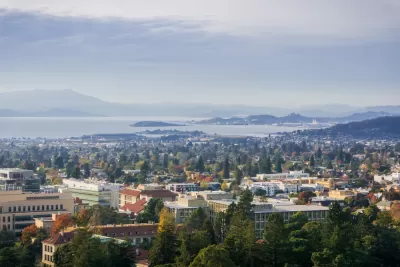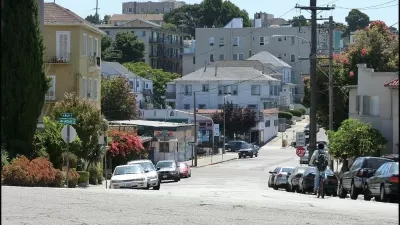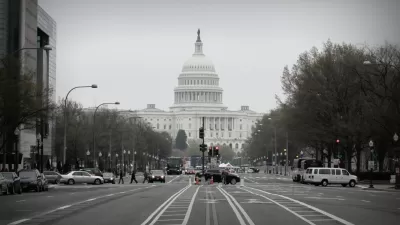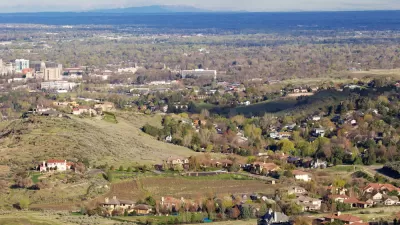The city that invented single-family zoning in 1916, for discriminatory purposes, will completely remove that exclusionary legacy from its zoning code.

The Berkeley City Council, the very first city in the United States to implement single-family zoning, now commonly referred to as exclusionary zoning, has voted to completely upend that legacy.
By a unanimous vote of 9-0, the Berkeley City Council last night decided to end single-family zoning citywide, the latest in a string of U.S. cities to reform the planning and zoning status quo. Earlier this year, Sacramento approved similar actions. Berkeley Councilmember and Vice Mayor Lori Droste, along with councilmembers Terry Tapli, Ben Bartlett, and Rigel Robinson, authored the ordinance, which moved quickly after first being introduced at the beginning of February.
"In 1916, single-family zoning was born in Berkeley’s Elmwood neighborhood, forbidding the construction of anything other than one home on each lot. At the time, an ordinance stated that its intent was to protect 'the home against the intrusion of the less desirable and floating renter class,'" reports Sarah Ravani in an article that preceded a late-night vote on February 23.
The vote follows on the heels of several significant planning reforms in recent months. In December 2020, the city "approved rezoning the Adeline Street corridor and even added an extra floor of height to what builders could do there. The plan allows 1,450 new housing units, about half for low-income families in an area that was once a thriving Black, working-class community, but has become increasingly white as the high cost of housing has driven out many families."
And in January, the City Council voted to eliminate parking requirements for almost all residential properties in the city.
The vote only starts the process of updating the city's zoning code to eliminate zoning, a prices expected to be complete by December 2022. Then, of course, the new regulatory regime and the market will require time to shows effects of the change in the city. As made clear by Councilmember Droste during the hearing, even after the zoning changes, single-family housing will still be permitted in much of the city—it just won't be the only kind of housing permitted. (The city of Minneapolis, with a head start on a similar process, recently reached the crucial concluding phase of a similar zoning reform process.)
FULL STORY: Berkeley considers ending single-family zoning by December 2022: A 'big deal'

Manufactured Crisis: Losing the Nation’s Largest Source of Unsubsidized Affordable Housing
Manufactured housing communities have long been an affordable housing option for millions of people living in the U.S., but that affordability is disappearing rapidly. How did we get here?

Americans May Be Stuck — But Why?
Americans are moving a lot less than they once did, and that is a problem. While Yoni Applebaum, in his highly-publicized article Stuck, gets the reasons badly wrong, it's still important to ask: why are we moving so much less than before?

Research Shows More Roads = More Driving
A national study shows, once again, that increasing road supply induces additional vehicle travel, particularly over the long run.

Judge Halts Enforcement of Anti-Homeless Laws in Grants Pass
The Oregon city will be barred from enforcing two ordinances that prosecute unhoused residents until it increases capacity and accessibility at designated camping sites.

Advancing Sustainability in Los Angeles County Schools
The Los Angeles County Office of Education’s Green Schools Symposium brings together educators, students, and experts to advance sustainability in schools through innovative design, climate resilience strategies, and collaborative learning.

Using Old Oil and Gas Wells for Green Energy Storage
Penn State researchers have found that repurposing abandoned oil and gas wells for geothermal-assisted compressed-air energy storage can boost efficiency, reduce environmental risks, and support clean energy and job transitions.
Urban Design for Planners 1: Software Tools
This six-course series explores essential urban design concepts using open source software and equips planners with the tools they need to participate fully in the urban design process.
Planning for Universal Design
Learn the tools for implementing Universal Design in planning regulations.
City of Moreno Valley
Institute for Housing and Urban Development Studies (IHS)
City of Grandview
Harvard GSD Executive Education
NYU Wagner Graduate School of Public Service
City of Cambridge, Maryland
Newport County Development Council: Connect Greater Newport





























